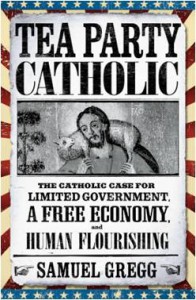Is greed really good? Does self-interest equal sin? Samuel Gregg takes on these questions at Aleteia.org, in an excerpt from his new book, Tea Party Catholic: the Catholic Case for Limited Government, a Free Economy and Human  Flourishing.
Flourishing.
In many ways, the free economy does rely upon people pursuing their self-interest rather than being immediately focused upon promoting the wellbeing of others.
One response to this challenge is to recognize that fallen humanity cannot realize perfect justice in this world. ‘We can try to limit suffering, to fight against it’, Pope Benedict wrote in Spe Salvi, ‘but we cannot eliminate it.'[v] This Christian truth helps us to understand, like Saint Augustine, that what fallen humanity can achieve ‘is always less than we might wish.'[vi]
Gregg argues that there IS self-interest involved in the free market, and that’s fine: it is balanced by the search for what will meet the needs of others, which in turn makes for good business.
In Centesimus Annus, John Paul II developed similar insights, but made specific reference to self-interest. In practical terms, the pope noted, violent suppressing self-interest results in its replacement with burdensome state bureaucracy that slowly drains creativity out of society. To this hard-to-deny historical observation, John Paul added the following insight from Christian anthropology. ‘Man,’ he wrote, ‘tends towards good, but he is also capable of evil. He can transcend his immediate interest and still remain bound to it. The social order will be all the more stable, the more it takes this fact into account and does not place in opposition personal interest and the interests of society as a whole, but rather seeks ways to bring them into fruitful harmony.'[vii]
The market economy is one way of realizing this harmony, albeit often indirectly. If, for instance, a business fails to produce new or better products at lower prices, it risks disappearing altogether, along with the jobs and capital it creates. Entrepreneurs and businesses consequently have to identify the needs and wants of consumers and then work out how to meet such needs and wants in a faster, less expensive manner. A certain alignment is thus established between a business’s pursuit of its self-interest and other people’s economic wellbeing, without anyone actually intentionally choosing such harmonization as their primary goal.
Gregg does warn against crony capitalism, saying that this is injurious, and not part of a truly free market economy. It is not just. He calls those involved in such practices “political entrepreneurs: experts at gaming the system rather than meeting consumer needs.”

